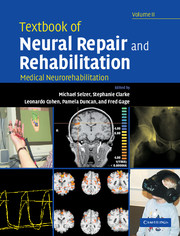Book contents
- Frontmatter
- Contents
- Preface
- Contributors
- Contributors
- Neural repair and rehabilitation: an introduction
- Section A Technology of neurorehabilitation
- Section A1 Outcomes measurement and diagnostic technology
- Section A2 Therapeutic technology
- Section B Symptom-specific neurorehabilitation
- Section B1 Sensory and motor dysfunctions
- Section B2 Vegetative and autonomic dysfunctions
- Section B3 Cognitive neurorehabilitation
- 26 Rehabilitation for aphasia
- 27 Apraxia
- 28 Unilateral neglect and anosognosia
- 29 Memory dysfunction
- 30 Neurorehabilitation of executive function
- 31 Rehabilitation of dementia
- Section C Disease-specific neurorehabilitation systems
- Index
- Plate section
31 - Rehabilitation of dementia
from Section B3 - Cognitive neurorehabilitation
Published online by Cambridge University Press: 04 August 2010
- Frontmatter
- Contents
- Preface
- Contributors
- Contributors
- Neural repair and rehabilitation: an introduction
- Section A Technology of neurorehabilitation
- Section A1 Outcomes measurement and diagnostic technology
- Section A2 Therapeutic technology
- Section B Symptom-specific neurorehabilitation
- Section B1 Sensory and motor dysfunctions
- Section B2 Vegetative and autonomic dysfunctions
- Section B3 Cognitive neurorehabilitation
- 26 Rehabilitation for aphasia
- 27 Apraxia
- 28 Unilateral neglect and anosognosia
- 29 Memory dysfunction
- 30 Neurorehabilitation of executive function
- 31 Rehabilitation of dementia
- Section C Disease-specific neurorehabilitation systems
- Index
- Plate section
Summary
There is a neural substrate to support rehabilitation in those with dementia
When the central nervous system is abruptly injured, such as from stroke or traumatic brain injury, the premorbid neural reserve determines how the brain responds spontaneously without explicit therapeutic intervention. This concept also is relevant to those who have neurodegenerative diseases such as dementia, in that even though the neural substrate can be considered in continuous state of decline, the brain spontaneously may attempt to salvage or repair damaged tissue without exposure to treatments. Given exposure to rehabilitative treatments, it has been postulated that the brain will respond at a neural level to support its attempts to salvage/repair damaged tissue and even recover when exposed to these behaviorally based treatments. What remains elusive is when treatments as applied during rehabilitation are either supportive or possibly detrimental to spontaneous neural recovery. Moreover, in the context of dementia, at which point in the disease trajectory that the neural reserve capacity is completely depleted such that even the most passive learning situations are fruitless, is similarly elusive.
The work of Katzman et al. (1989) and Satz (1993) has supported the concept of the determinism of neural repair/recovery by the brain's reserve tissue capacity in their studies of Alzheimer's disease. Reserve capacity has been associated with brain size. Katzman et al. (1989) reported the histopathologic features of a small group of octogenarians who were cognitively intact and healthy. The surprising finding was that these individuals had neuropathological findings consistent with Alzheimer's disease.
Keywords
- Type
- Chapter
- Information
- Textbook of Neural Repair and Rehabilitation , pp. 488 - 512Publisher: Cambridge University PressPrint publication year: 2006



